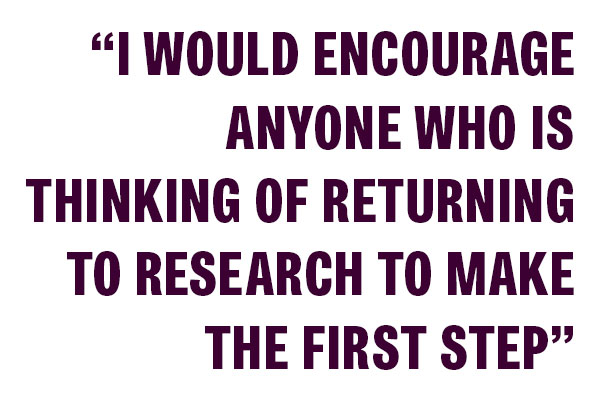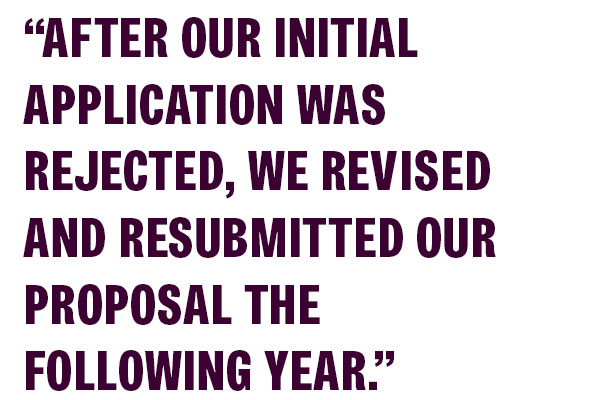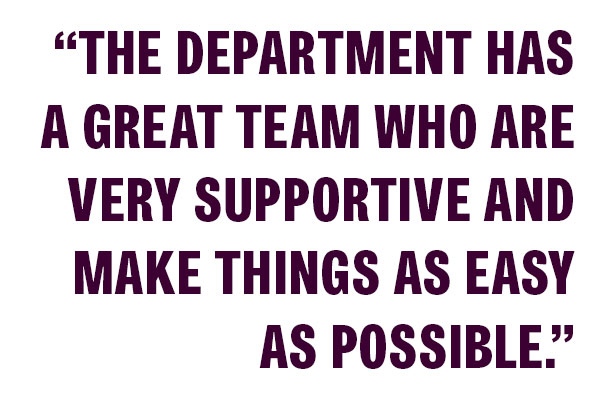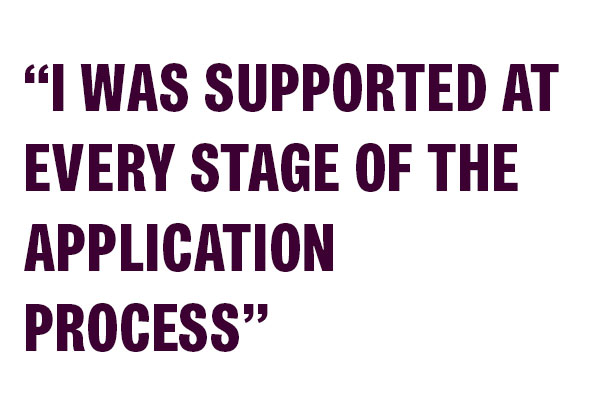
Fellowship application case studies
Dr Liz Dickinson
After completing my PhD and a short post-doctorate position, I took a seven year career break to start a family. Over a catch-up coffee, my PhD supervisor encouraged me to apply to the Daphne Jackson Trust. This charity supports STEM researchers in returning to their careers following a career break. They offer a part-time fellowship and retraining that aims to build confidence and skills.
I enjoyed multivariate statistics and pattern recognition (“chemometrics”) during my PhD, so found an expert in these techniques on the University of York webpages. Professor Julie Wilson's research covers a wide range of fascinating projects, including links to archaeology, analytical chemistry and collaborations with industry. I approached Julie, who was very encouraging, and was keen to act as supervisor for my Fellowship. Julie, the University of York, and the Daphne Jackson Trust were all very supportive during the application process, which took around 9 months to complete.
My application was successful and I secured a two-year Fellowship to use chemometrics to analyse data from plant varieties exposed to drought and disease. My Fellowship was supported by the Departments of Mathematics and Chemistry, and was also in collaboration with Fera Science Ltd. This academic breadth and industrial partnership provided fantastic opportunities for retraining and reintegrating back into research.
The Department of Mathematics was extremely welcoming and supportive and helped with personal development. I was able to continue working with Julie in the Department as an Associate on a Knowledge Transfer Partnership (KTP) with Croda International Ltd. The Department was supportive of flexible working and this role was also part-time. I am delighted to have now secured a permanent position as a lead technical data scientist at Croda.
Since my Fellowship, more Daphne Jackson Fellows have started in the University of York and the Department. I would encourage anyone who is thinking of returning to research to make the first step of contacting the Department of Mathematics. I have thoroughly enjoyed returning to research here and think that the support offered has been invaluable. Plucking up the courage to make those first enquiries was one of the best decisions I ever made!
Find out more information about the Daphne Jackson Fellowships.


Dr Paul Razafimandimby
After completing my PhD in Mathematics in 2011, I held several postdoctoral positions in South Africa, Italy and Austria. In September 2016, I gained a lectureship position at the University of Pretoria, being promoted to Senior Lecturer in 2019.
I had started discussing the mathematical theory of nematic liquid crystal with Professor Zdzislaw Brzezniak — an academic in the Department of Mathematics, who was the external examiner of my PhD thesis — in 2011. These discussions led to a three year research project with Professor Erika Hausenblas at University of Leoben, funded by the Austria Science Fund, starting in 2013. This grant enabled me to continue my research in Austria and visit and collaborate with Prof. Brzezniak.
It was during these collaborative visits to University of York that the idea of applying for a Marie Sklodowska-Curie fellowship emerged. These two year fellowships are funded by the European Commission, and support the mobility of researchers who have a doctoral degree (or at least four years of full-time research experience) within and beyond Europe.
After our initial application was rejected, we revised and resubmitted our proposal the following year. This proposal was funded, and I started my fellowship in the Department of Mathematics in January 2019.
As well as the help that I received from Professor Brzezniak and other academics, the Department's support staff were also very helpful. For example, during the development and writing of the proposal, they arranged for peer reviewers to provide feedback and comments, helped with the administration of the application, and provided me with tips and previous examples of successful applications. After the fellowship was awarded, they were also very helpful during the relocation to York. In summary, the Department of Mathematics has been very supportive both with my scientific and personal development.
Paul is now an Assistant Professor at the School of Mathematical Sciences at Dublin City University.
Find out more information about Marie Skłodowska-Curie Postdoctoral Fellowships.
Chris Bowman-Scargill
After completing my undergraduate at York in 2008, I went to Cambridge for my PhD and had postdoctoral positions in Paris and London before getting my first lectureship at the University of Kent in 2017.
My research is currently supported by an EPSRC early career fellowship. I have also secured fellowship funding from the Royal Commission for the Exhibition of 1851, Marie Curie, and the Alexander von Humboldt foundation.
I have also had plenty of failed funding bids! These have come from as far and wide as the Royal Society, the European Research Council (twice!), Marie Curie, Leverhulme, and EPSRC.
The most important thing I’ve learnt from all of the above is that these applications involve a heavy dose of luck, and that you shouldn’t let rejection get you down (or indeed, let success make you feel too smug!). You do sacrifice some of your time as an initial investment, but you can always up-cycle and further develop your ideas for future applications. The Department has a great team who are very supportive and make things as easy as possible.
Securing fellowship funding has allowed me to move back to York (my dream!) and given me the time to develop my research without constant distraction. I would strongly recommend to anyone that it is well worth applying.
Find out more information about EPSRC early career fellowships.


Fiona Bate
After completing a PhD in Applied Mathematics, I worked for the Higher Education Academy for a year before obtaining a research post in industry. After three years in industry, I took an 11 year career break to bring up my children. I was keen to return to research after my career break and applied for a sponsored Daphne Jackson Fellowship at the University of York. The Daphne Jackson Trust offers part-time fellowships to researchers returning after a career break.
I approached Martin Bees and Mitya Pushkin in the Department of Mathematics who were very encouraging towards my application and were keen to supervise my Fellowship. After an initial application and a couple of interviews I was successfully chosen as a preferred candidate by the University and asked to submit a proposal to the Daphne Jackson Trust. My proposed project involved producing and analysing mathematical descriptions of the biological and physical processes involved in anaerobic wastewater treatment, an interdisciplinary collaboration with the Department of Biology.
I was supported at every stage of the application process, which in total took around 15 months, by Martin and Mitya and other staff in the Department, especially Annabel Jenkins the Department’s Research Facilitator. I also benefited from the invaluable experience of Liz Dickinson, a former Daphne Jackson Fellow in the Department. My application was successful and I began my Fellowship in September 2019.
The Department of Mathematics continued to support me throughout my Fellowship enabling personal as well as academic development. The Department is encouraging of flexible and part-time working, which has enabled me to balance work responsibilities and childcare. Since my Fellowship ended in 2022 I have continued to work in the Department after successfully obtaining a part-time postdoctoral position.
I would encourage anyone thinking of applying for a Fellowship to consider applying to the Department of Mathematics in York. The Department’s academic and support staff are extremely helpful and encouraging and it is a welcoming place to work.
Find out more information about Daphne Jackson Fellowships.
